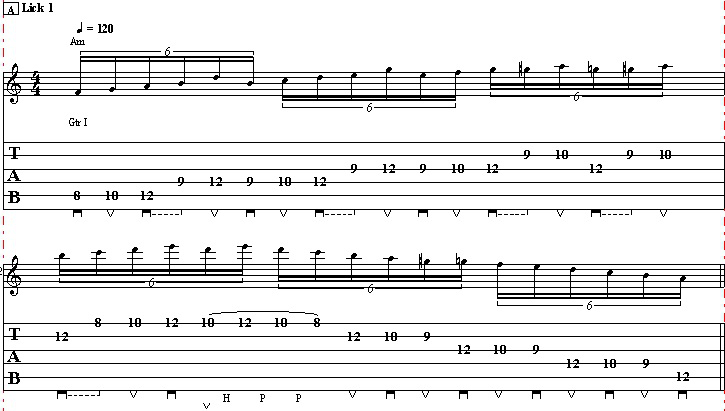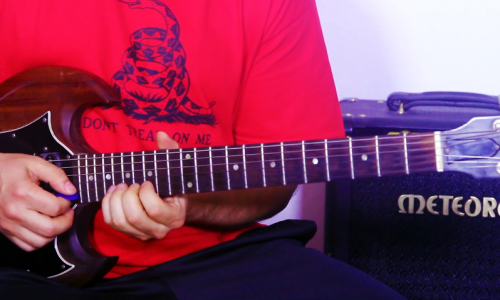Check out these fun and easy ascending and descending sequences for creating your own killer licks with Guitar Control instructor Darrin Goodman, aka Uncle D. Be sure to get the free tabs to go along with the step by step video instruction and you will be playing some killer licks tonight!
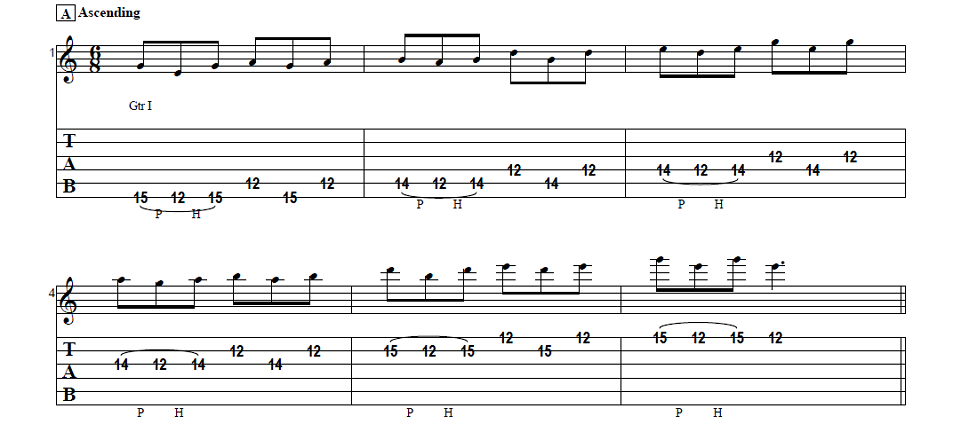
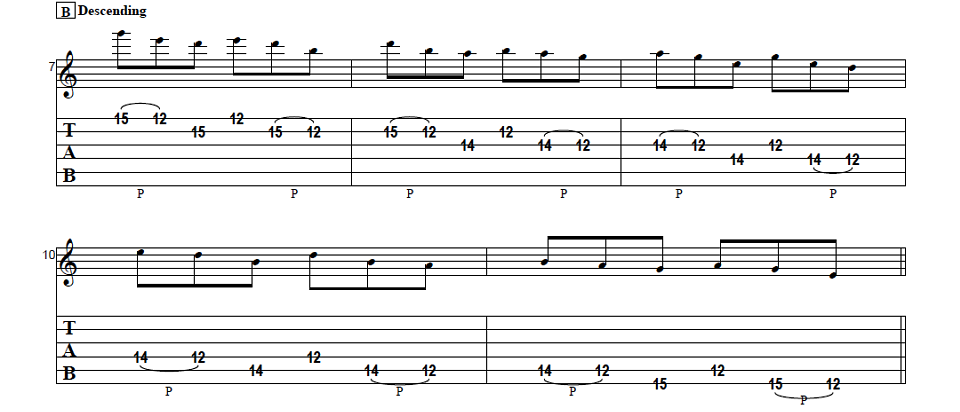
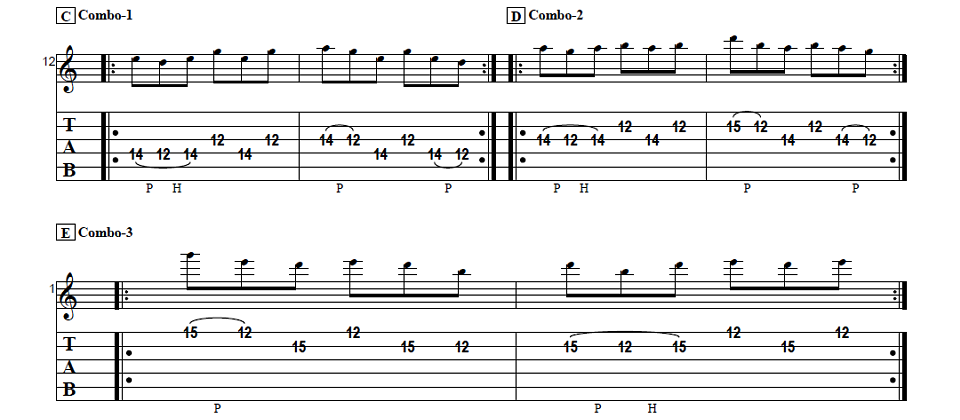
Introduction
How’s it going everybody? This is Darrin with GuitarControl.com bringing you this video lesson and today I want to show you two pentatonic sequences, one that is ascending and one that is descending, and then I’m going to show you some examples of how you can take just a snippet of each one and put them together and make some really cool sounding licks that are pretty easy to play.
So right now, Guitar Control is giving away this really awesome daily practice routine to improve your lead guitar chops. This was put together by our very own Silvio Gazquez, a two-time Guitar Idle finalist. This routine covers the four main concepts that are necessary for lead guitar; alternate picking, legato, sweep picking and tapping. All the tabs and exercises are all included in this free ebook and there’s a link in the description where you can get yours.
So be sure to click on the link in the description for the tabs and let’s get close up and take a look at these.
Ascending Sequences
All right, so the first one we’re going to look at is the ascending portion and I’ve got this divided up into each section is a group of six notes and I’ve divided it up that way to make it easier to memorize it. So we’re doing this in E minor, but it’s just with the first pentatonic box pattern, but you can play this in any key, you can just move it around. So what we’re going doing is we’re going to start off with your first finger here on the 12th fret of the low E string and then we’re going to pick up the 15th fret and sometimes I’ll do it with my pinky and sometimes I’ll do it with my third finger; once I get to the 12th fret I don’t use my pinky as much because of space. But anyway we’re going to start off by going to pick the 15th fret and pull to the 12th and then hammer back to 15 and we’re going to go to the 12th fret on the A string and back to the 15th fret on the E and back to the 12th fret on the A string. So that’s six notes; one, two, three, four, five, six… Okay now we’re just going to repeat the same sequence across all the rest of the strings. So our next pair is going to be the A and the D string. So now just like the pentatonic scale we’re moving to the 14th fret so we’re going to be on the 12th fret with our first finger and the 14th fret with our third finger and we’re going to pick 14, pull to 12, Hammer to 14 and then to the 12th fret of the D string, back to the 14th fret of the A string, back to the 12th fret of the D string. So, so far we’ve got… Now we’re just going to keep moving the sequence up so now we’ll start on the D string, then start on the G string and now on the B string remember now we have to go back up to the 15th fret. So you can play the whole thing like an exercise… So that is our ascending portion. Now obviously you could already use that as a lick, but not necessarily the entire sequence. Maybe you’ll just you know use a part of it… something like. Okay so now let’s look at the descending part, it’s like kind of the counterpart to this.
Descending Sequences
So again we’re in E Minor we’re still using that same pentatonic pattern and this is a group of six notes again. So now we’re going to start at the top of the scale; so first fingers on the 12th fret and the 15th fret of the high E string, again sometimes I’ll use my pinky sometimes I use my third finger, and we’re going to pick the 15th fret and pull the 12th to the 15th fret of the B string, back to the 12th fret of the high E and then pull 15 to 12 on the B string. Okay so the sequence is just going to continue do on the B string. Now I’m going to go to the G string, remember we have to go from the 15th fret down to the 14th fret now. The G to the D string, the D to the A string and then the A to the low E… Again you could just use part of that too… you know, whatever.
So now what I do is I want to show you how by taking part of the ascending portion and part of the descending portion and connect them together you can come up with some really cool sequences.
Combining Sequences
All right so for this first combination we’re going to do it on the D and the G string and this is just kind of a nice neutral spot to kind of practice to get the pattern down. So I’ve got my first finger on the 12th fret of the D string and my third finger on the 14th fret of the D string and I’m going to pick and pull and then do a hammer-on back on to the 12th fret of the G string, back to the 14th fret of the D string and back to the 12th fret of the G string. So this is just like the ascending part that we did earlier… Now for the second half we’re going to do the second measure is going to be the descending part. So we ended off here on the 12th fret of the G string with our first finger so now we’re going to put our third finger onto the 14th fret on the G string we’re going to pick and pull-off to 12 and follow that with the 14th fret of the D string back to the 12th fret of the G string and then the 14 pull to 12 on the D string and then the whole thing would just repeat… So it’s pretty cool lick and it’s fairly easy to build up some speed. Now you could pick every note if you wanted. You could do all the hammer-ons or pull-offs or whatever you kind of make it your own. This is just the way that I personally like it.
All right so the second combination we’re going to look at is basically going to be the exact same thing, but we’re going to do it between the G and the B string. So this is going to be just a little bit more difficult, but it’s still the same idea. So we’re starting pulling 14 to 12 on the G string and hammering back to 14 to the 12th fret of the B string, back to the 14th fret of the G string, back to the 12th fret of the B string… And on the second half we’re gonna have to go 15 on the B string pull to 12 to the 14th fret of the G string, back to the 12th fret of the B string and then 14 pull on the G string… So that one’s quite a bit harder because you’re having to make that transition and you see that I kept changing which fingers I’m using because I’m still trying to figure out exactly how I would want to play that part.
Okay and then the last one and this is the one that I really think sounds cool. I hope that I can play it well enough here to give you a good example. We’re going to start on the high E string and we’re gonna pull 15 to 12 to the 15th fret of the B string to the 12th fret of the high E string and then 15 to 12 on the B string; so this is the descending leg… So that last 15 to 12 you could pull that too or pick it. Okay so then the second measure we left off herel so on the 12th fret of the on the B string. So now we’re going to go back to 15 we’re going to pull the 12 hammer back to 15 to the 12th fret of the high E, back to 15 on the B string and then back to 12 on the high E and then it would just the whole thing would repeat. All right, so like I said that one really I think that one really sounds cool and it’s a really cool lick. I need a lot more practice with it to really be able to play it quick, but it isn’t really that hard to get the sequence down. So if you were gonna try to do that across all the strings, like a long continuous run or something, you wouldn’t be able to do what I’m about to show you here, but with this what makes this kind of easy is if you just barre your first finger on the 12th fret of the B and the high E string then all you have to do is really move your third finger… but as you move down you have… I’m gonna try to do that, which I really don’t recommend.
Conclusion
All right, so there you have it a cool ascending and a cool descending pentatonic sequences and then combining them together to make different licks. So obviously those aren’t all of the ways you could do that. So just mess around with it and come up with your own ideas really try to make it your own. So if you like this lesson be sure to give me a thumbs up and leave a comment if you have any questions about this or other guitar related subjects. If you have not already done so, please subscribe to the channel and hit that notification bell so you don’t miss any of the content we up load throughout the week. That is all I have for you today. Thanks for watching and have a great day.


